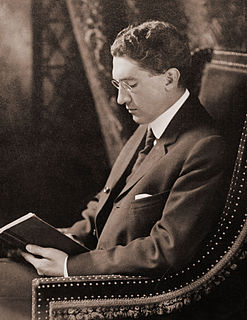A Quote by Pope Benedict XVI
Each generation, as it seeks to advance the common good, must ask anew: 'What are the requirements that governments may reasonably impose upon citizens, and how far do they extend? By appeal to what authority can moral dilemmas be resolved?'
Related Quotes
What you do is as important as anything government does. I ask you to seek a common good beyond your comfort; to defend needed reforms against easy attacks; to serve your nation, beginning with your neighbor. I ask you to be citizens: citizens, not spectators; citizens, not subjects; responsible citizens, building communities of service and a nation of character.
There must appear a spiritual and moral leadership rising above economic and political situations. Governments in both their domestic and foreign policies appeal for popular support by promises of material gain. We cannot make peace by mere appeal to greed. We must give the peoples of the world something to live for as well as something to live on.
Nothing is more deceptive or more dangerous than the pretence of a desire to simplify government. The simplest governments are despotisms; the next simplest, limited monarchies; but all republics, all governments of law, must impose numerous limitations and qualifications of authority, and give many positive and many qualified rights.
People who reject transcendent authority can no longer persuade one another through rational arguments; everything is reduced to personal opinion. Debates about ideas thus degenerate into power struggles; we're left with no moral standard by which to measure the common good. For that matter, how can there be a 'common good' without an objective standard of truth?
For what is meant by saying that a government ought to educate the people? Why should they be educated? What is the education for? Clearly, to fit the people for social life - to make them good citizens. And who is to say what are good citizens? The government: there is no other judge. And who is to say how these good citizens may be made? The government: there is no other judge. Hence the proposition is convertible into this - a government ought to mold children into good citizens, using its own discretion in settling what a good citizen is and how the child may be molded into one.
In separating out, say, legal and moral requirements, I tend to work with paradigms rather than strict divisions - eg, paradigmatically, legal requirements are jurisdictionally bound whereas ethical requirements are aspirationally universal; ethical requirements focus especially on intentions whereas legal requirements focus primarily on conduct; ethical requirements take priority over legal requirements; and so on.
Man, no doubt, owes many other moral duties to his fellow men; such as to feed the hungry, clothe the naked, shelter the homeless, care for the sick, protect the defenseless, assist the weak, and enlighten the ignorant. But these are simply moral duties, of which each man must be his own judge, in each particular case, as to whether, and how, and how far, he can, or will perform them.




































